THEATRE
Rude awakening? In this daring musical, rebellious teens sing about sexual discovery and other struggles
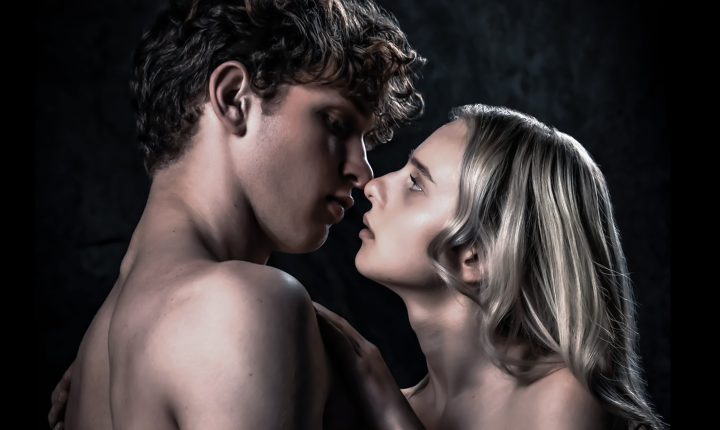
Based on a banned play from the 1890s, Spring Awakening is a coming-of-age musical that combines a pop-rock score with an emotional rollercoaster of a story about adolescent angst and sexual discovery. It’s been called ‘the musical theatre canon’s edgiest ode to teenage repression’ and for the local student cast at Lamta who’ve found themselves in the caring hands of director Sylvaine Strike, it’s been a theatrical rite of passage.
It’s daunting. Their flexibility, their gymnastic elasticity, their verve, pizzazz and stamina. They possess all those wondrous qualities of youth, yet even these marvellous attributes are amplified by the fact that they’re actors preparing for a life in musical theatre. It’s their job to make everything look and feel so much bigger, brighter, bouncier.
They make it look easy, too. You get swept up by their energy. They have it coming out in buckets, that love of performing, of being seen, having their stories heard, their deep desire to grab your attention and move you.
Yes, even you in the back row.
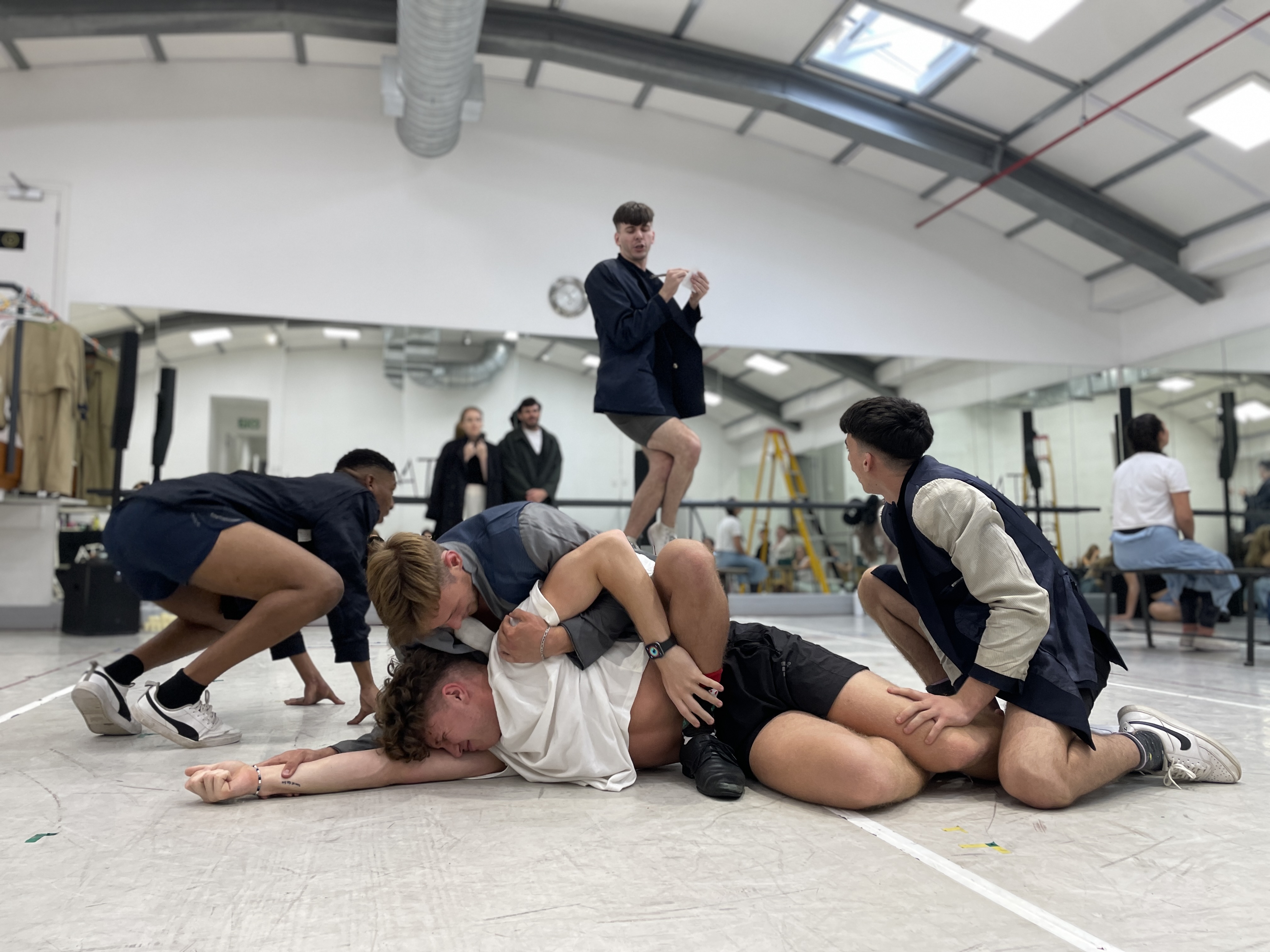
Dylan Janse van Rensburg (lying on the floor) during a final-week rehearsal of ‘Spring Awakening’. (Photo: Duane Alexander)
I was somewhere high above the theatre in a large attic studio, walls lined with mirrors and ballet barres, the cast hard at work, singing like their lives depended on it, dancing their socks off, acting with such conviction. It was a week before the show’s opening, their seventh week of “full-on” night-time and weekend rehearsals, most of the cast students at Lamta, a musical theatre school that has them juggling a furious schedule of daytime classes and exams.
One moment I was watching a classroom full of schoolboys squirming through a Latin lesson, their teacher a grotesque bully keen to haul out his stick. Suddenly, between bits of verbal abuse and caning, the boys broke into a song-and-dance number revealing their minds’ inner workings with athletic choreography and lyrics belted out. Then, just as suddenly, they returned to the reality of schoolwork drudgery and being picked on.
Later, through one of those fabulous tricks of theatrical imagination, the cast transformed into a forest, a scene so vivid I could almost make out branches and leaves blowing in the breeze, sound effects so real. Between the trees, a boy named Melchior and a girl named Wendla were discovering one another, the first tendrils of young love — and lust.
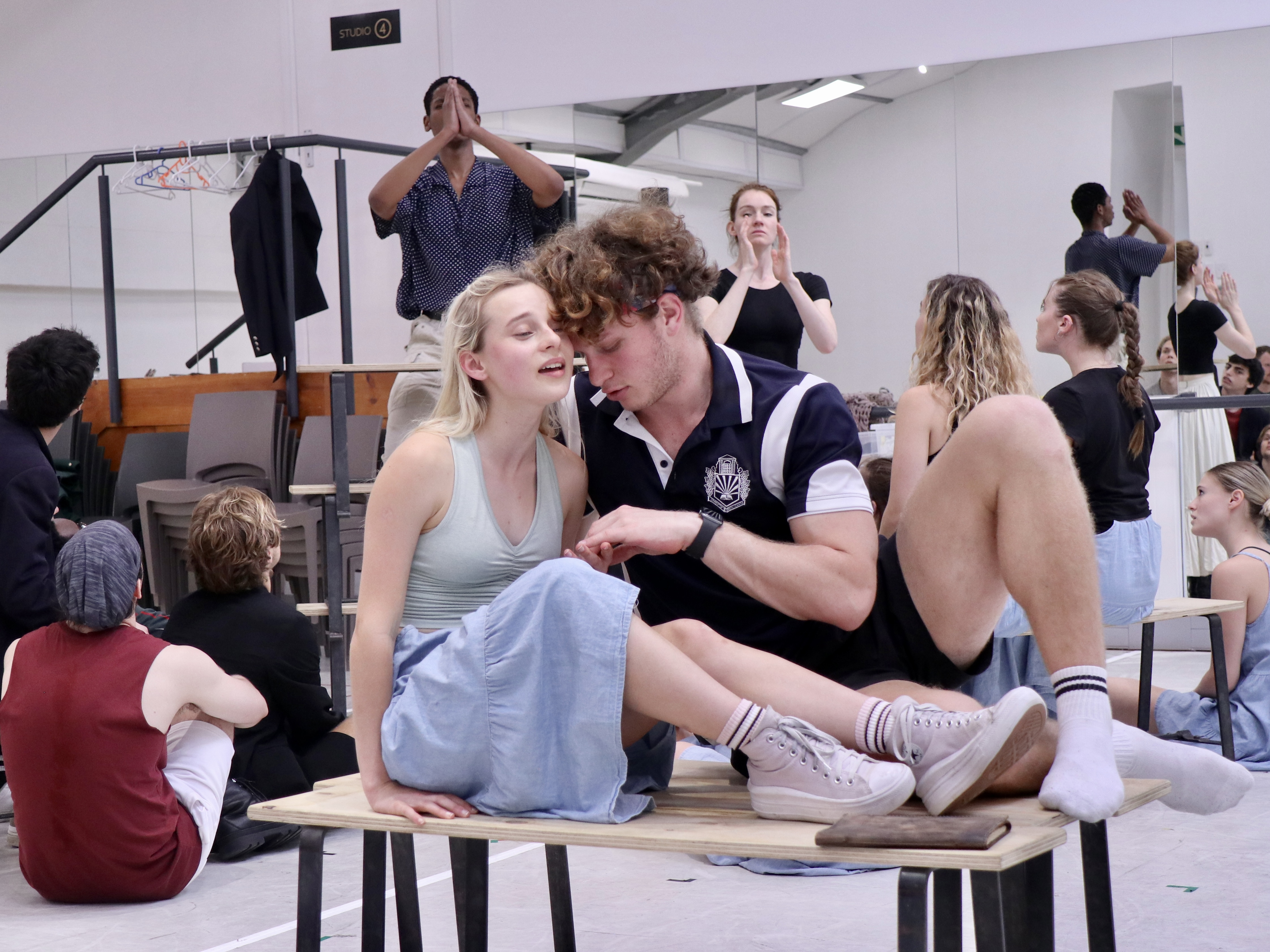
Dylan Janse van Rensburg as Melchior and Scarlett Pay as Wendla rehearse a pivotal intimate scene from ‘Spring Awakening’. (Photo: Ingrid Van Blerk)
Tempestuous beginnings
The musical they were rehearsing is Spring Awakening. Compared with Grease or Sound of Music, it’s barely known in South Africa, yet when it debuted on Broadway in 2006 it won eight Tony Awards, including Best Musical.
That’s a far cry from the show’s early origins. In 2009, The Guardian ran a headline, “Banned sex play now a teenage hit”, alluding to the fact that the original play upon which the musical is based, was banned in Germany for 15 years before finally being performed in 1906.
Frühlings Erwachen, or The Awakening of Spring, was written by Frank Wedekind, one of the fathers of expressionism. The controversial play follows a group of teens struggling with emerging sexual feelings without guidance from their parents. Its frank treatment of puberty, sexuality, rape, child abuse, homosexuality, atheism, suicide, abortion and death was too much for turn-of-the-19th-century Europeans, and when it was first performed in English in the US in 1917, it was threatened with closure for being “too pornographic”. A two-night run in England in 1963 was heavily censored.
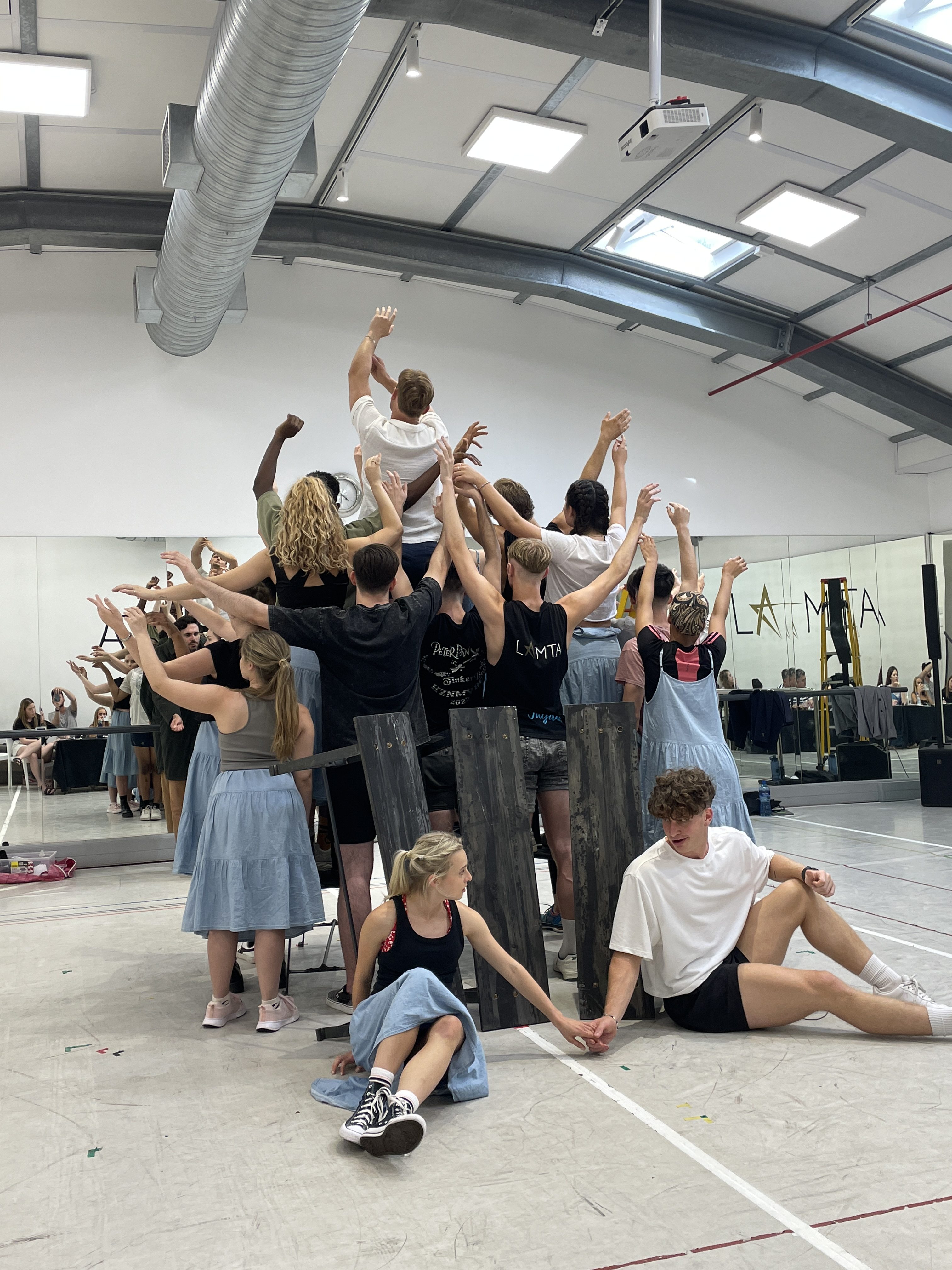
Dylan Janse van Rensburg as Melchior and Scarlett Pay as Wendla experience a discovery of romantic yearnings during rehearsal. (Photo: Duane Alexander)
But adapted and reframed as a musical by Duncan Sheik and Steven Sater in 2006, the show was widely embraced — not only on Broadway but as a smash hit wherever it’s performed. Still, though, it manages to raise conservative hackles. NBC even made a TV series about a fictitious high school’s struggle to stage the musical without puritanical interference.
The show’s pretty electrifying. Not only because the music is difficult and powerful (“the most gorgeous Broadway score this decade”, according to Entertainment Weekly), but because it grapples with something relevant and real — the trials and tribulations of adolescents making sense of their sexual identities and exploring their desires in an oppressive society.
Rough ride
While the musical adaptation leans into love, hope and redemption in ways that Wedekind’s original didn’t, it doesn’t sugarcoat the hard-hitting themes nor is it designed to make you feel comfortable or comforted. Quite the opposite. Bad things are happening to the children at the heart of the story, and those issues should make us squirm in our seats, sit up and take notice.
Still, while it hits a lot of hard notes, it is also fun. And, yes, it’s pretty raunchy.
“The song Touch Me is essentially about its characters experiencing their first orgasm,” says Dylan Janse van Rensburg, who plays Melchior (and is a dead ringer for Jonathan Groff who played him in the original Broadway show).
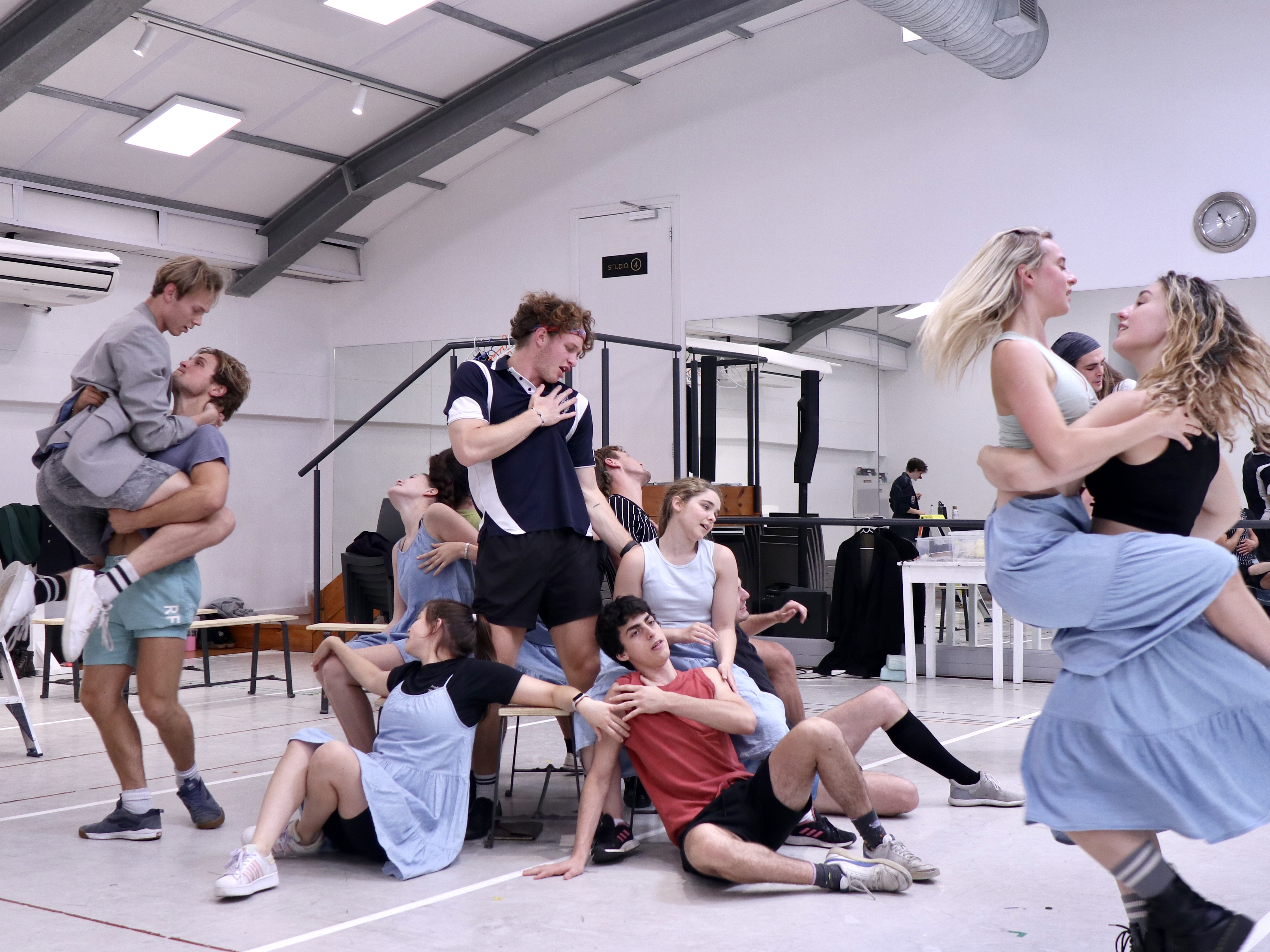
Dylan Janse van Rensburg (hand to heart in the centre) and some of the cast rehearsing a dance number from ‘Spring Awakening’. (Photo: Ingrid Van Blerk)
There’s also a number entitled Totally Fucked. And, along with scenes of lovemaking, some partial nudity, and plenty of crude adolescent banter, fantasising about body parts, and a bit of salacious hip-thrusting, there’s a hilariously protracted masturbation sequence likely to bring the house down.
Like I said: it doesn’t pussy-foot.
Change of script
While Spring Awakening is full of meaty themes, for the students it’s also a great opportunity to stretch themselves. When I spoke to them after their rehearsal, they said South African theatres don’t do enough cutting-edge musicals — shows that challenge the audience and challenge the performers.
“It makes me nervous that our local industry tends to consist mainly of the same musicals done over and over,” says Jo’burger Austin Tshikosi, who came to musical theatre through dance.
“We get a lot of Sound of Music, Mamma Mia, My Fair Lady, Grease… But as a young person, I’m hungry for new musicals, the ones that don’t regularly come to South Africa or that have never been done here.” He says part of the problem is that musicals tend to target older audiences. “It’s becoming harder to reach people our age, get young people to come to theatres. Our future depends on cultivating new audiences.”
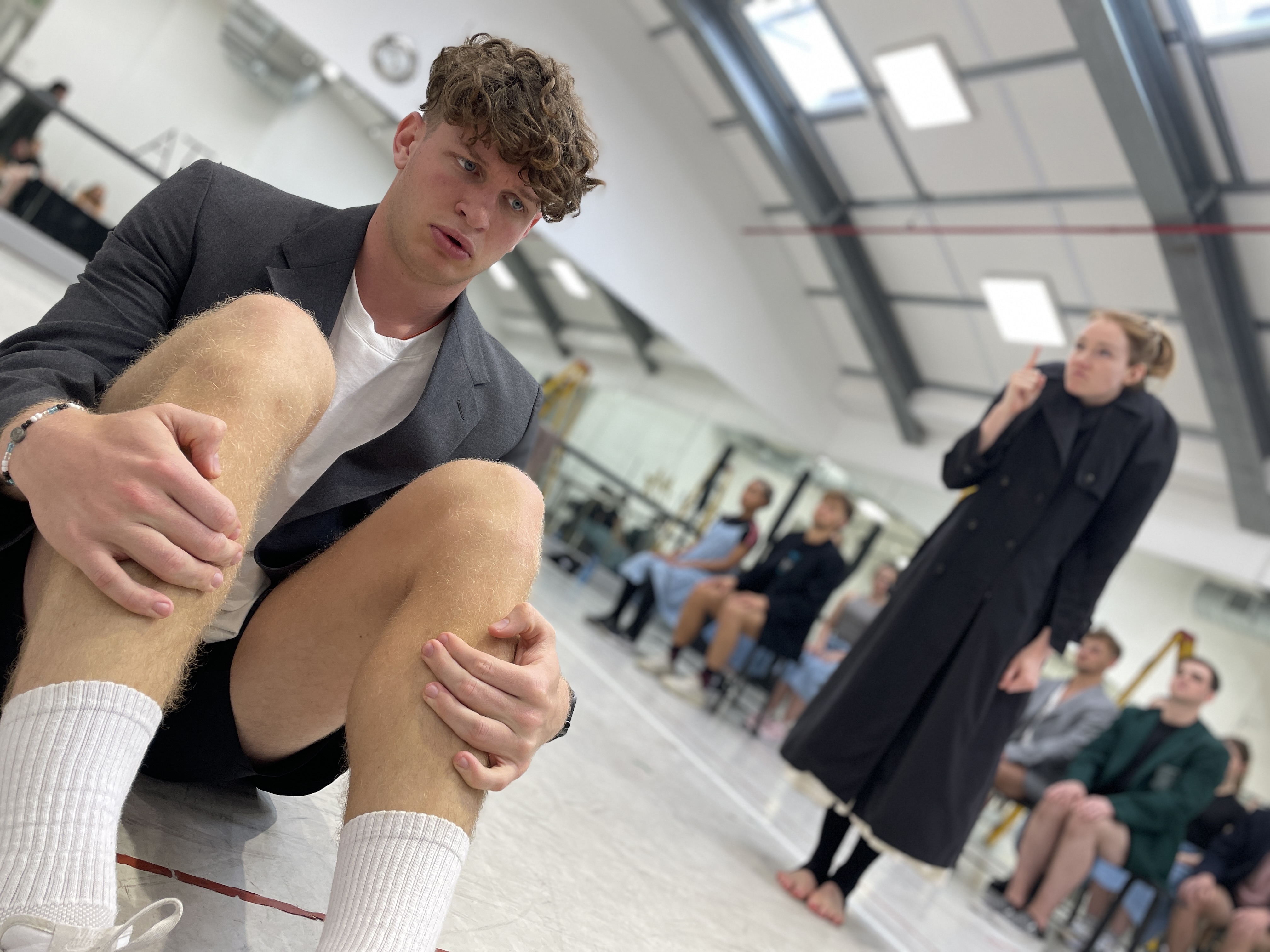
In a rehearsal of ‘Spring Awakening’, Dylan Janse van Rensburg as Melchior, with one of the ominous school teachers looming. (Photo: Duane Alexander)
“Most musicals in this country are derivative, overly familiar, and probably dated,” says Gianluca Girona, a final-year student with a blonde mop of hair and incredible talent. “They’re often blueprints of existing shows, where the choreographer already knows what they want and the director says, ‘Okay, come stand here and say blah-blah-blah’.”
Girona, who has already worked professionally, having been in The Buddy Holly Show last summer, says it’s not good enough. “Entertainment is so easy to come by nowadays. For youngsters, paying for a ticket and going to a theatre is a ‘whole thing’. To entice young audiences, what we do on stage needs to be new — it must be intriguing and relevant, and appealing to younger people.”
In that respect, Spring Awakening is a godsend, ideal for a young cast and relevant in that it explores issues of teenage sexual angst in a world ruled by adults whose motives are not always clear.
Path less travelled
Janse van Rensburg says that part of the thrill is that it’s so unknown; he was able to fall in love with the script from scratch.
Plus, it’s a show with plenty of opportunities for the actors to get their musical theatre fingers dirty. And to stretch themselves as performers.
Jasmine Minter, the show’s dance captain, adds that it also has complex music and difficult songs. “It’s got these intense, complicated, offbeat, incredible harmonies that are all on top of one another. You’ll be singing three octaves down, then suddenly you’re jumping way up. The score makes us work hard.”
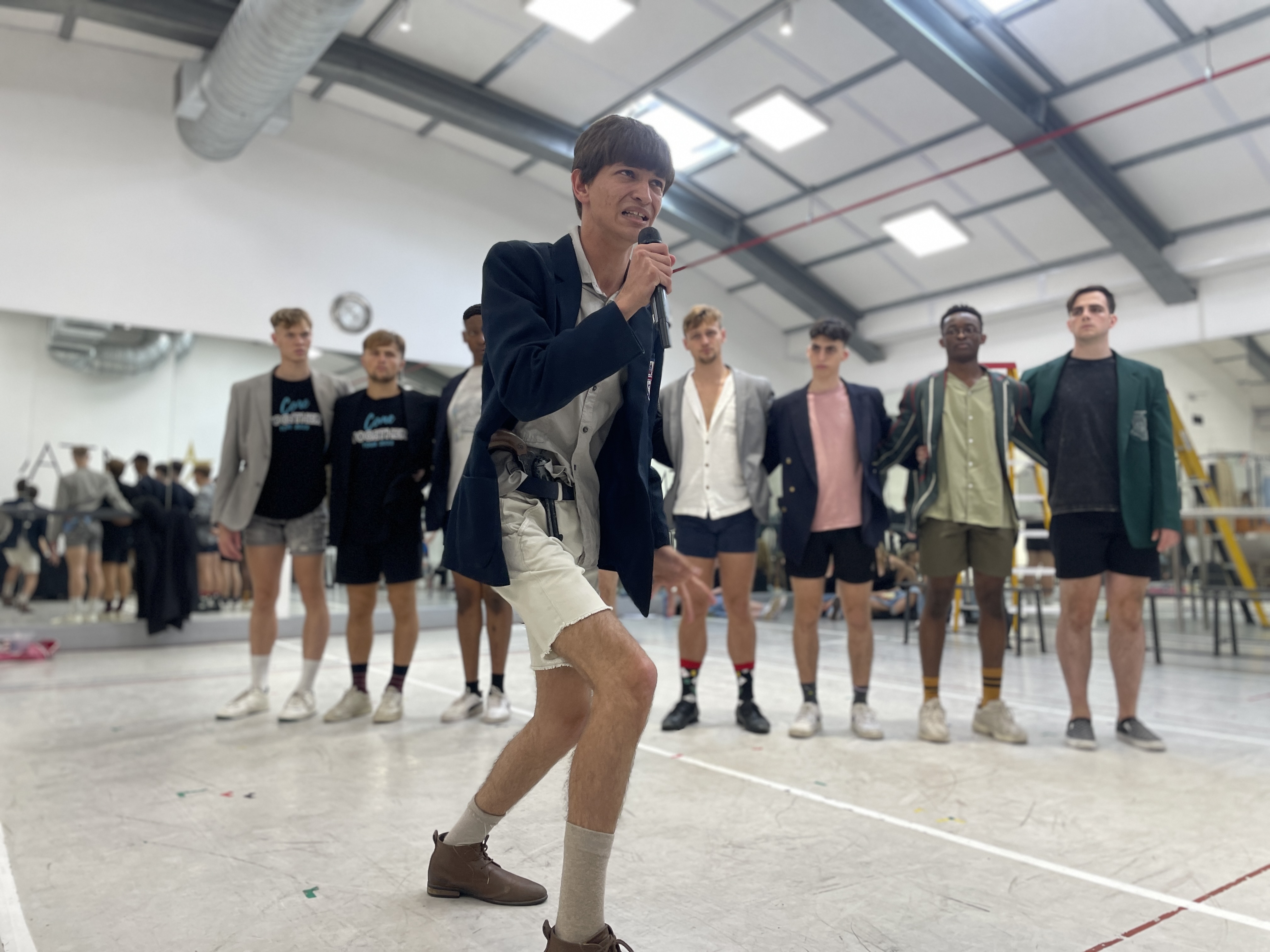
Johnathan Conrad sings with other cast members during a rehearsal of ‘Spring Awakening’. (Photo: Duane Alexander)
In fact, the show’s contemporary rock score has been credited with transforming the way Broadway thinks about musicals. Many of the songs work as opportunities for the characters to break free of their oppressive environment, liberated for the duration of the song as the actors dip into their inner rock star. In one scene, Johnathan Conrad, who plays Moritz, a boy who is thoroughly traumatised by puberty, grabs a mic and breaks into a post-punk, alternative-rock anthem that sees him crowd-surfing. I may have been watching a rehearsal, but it felt like I was at a rock concert.
Helming the production is Sylvaine Strike, the award-winning theatre maker who has spent much of the year overseeing another groundbreaking show, The Promise.
Strike, who says musicals aren’t her thing, is excited to be directing her first one. Being new to the genre means she’s been able to eschew convention, which also isn’t her thing.
Minter says working on this production has defied the norms of “typical musicals”. “Usually, you come in, learn the music, then learn the choreography, and the acting involves having the director tell you to walk to that spot where you say your line and these three people will run on in the background and do a cartwheel and carry on running. Very much by the book.”
Not under Strike’s watchful eye.
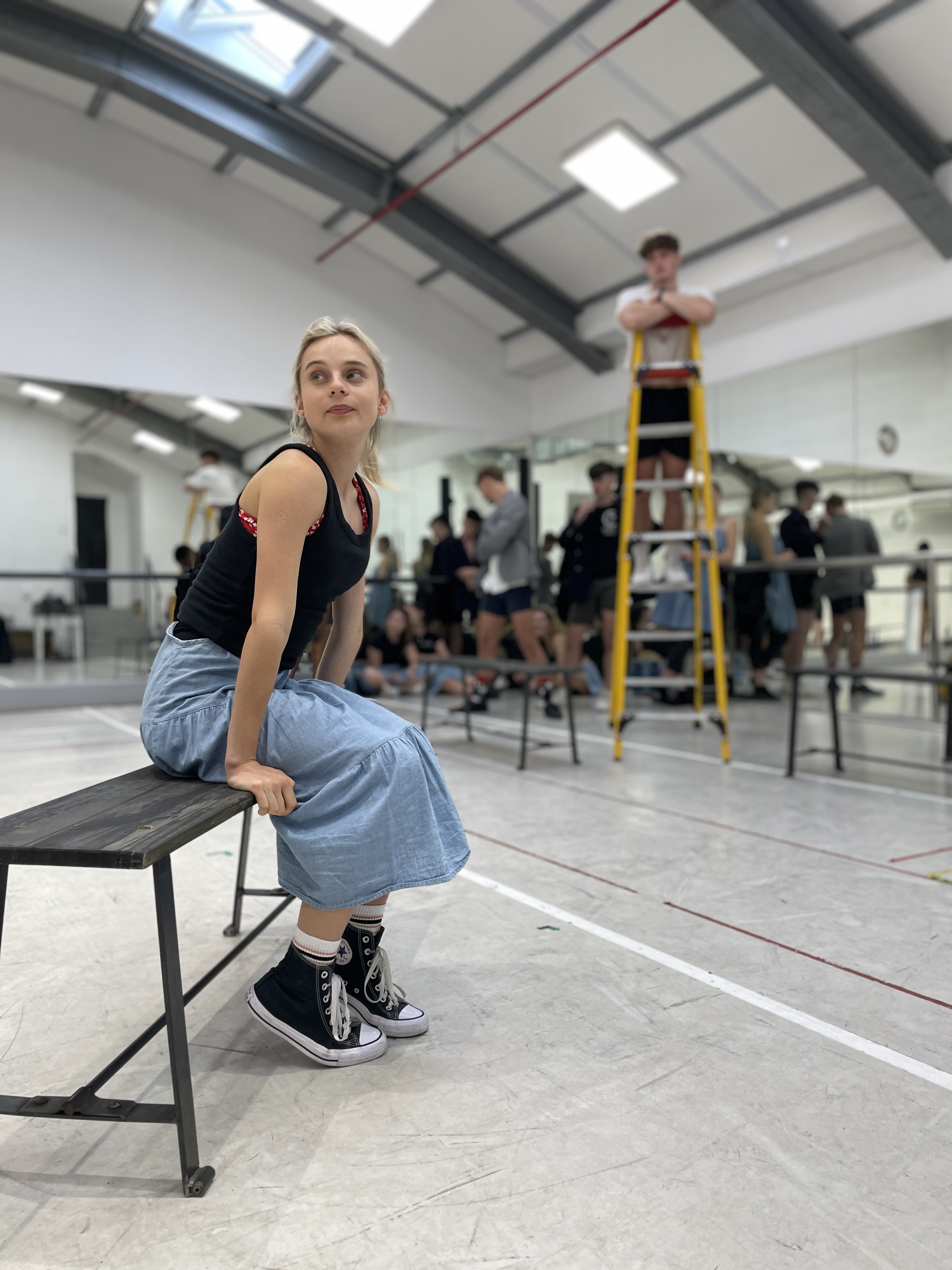
Scarlett Pay as Wendla, and Dylan Janse van Rensburg as Melchior watching from the ladder. (Photo: Duane Alexander)
Naoline Quinzin, who — alongside fellow final-year student, Anna Olivier — has choreographed the show, says she’s been struck by Strike’s refusal to lean into anything stereotypical.
“Rather than follow the blueprint of a typical musical, she began with a blank canvas — her aim is to create art, not reproduce what a musical ‘should be’.”
“Sylvaine’s work is so integrated,” says Girona. “She threw all that pre-made choreography and blocking out the window and involved the entire cast and crew in finding an organic way of telling a truthful story. She started by listening to everyone’s suggestions and has steadily moulded all the parts into shape, the way you’d carefully fold steel to create a sword that’s unbreakable.”
“Quite special is how Sylvaine has taught us to be a tightly knit cast,” says Nandipa Nyivana, a final-year student who hails from Vanderbijlpark. “We’ve become a single unit, so that through each and every moment we know we’ve got each other’s backs.”
Strike says these processes are vital. “With all my work, my hope is that the audience will feel attached to the people telling you the story. I never want an audience to watch without feeling invested. That comes from the way I work with my actors and the entire creative team — creating an almost sacred place. I enter the work with a huge amount of reverence for my actors and for the text. And as much as I dissect and interrogate and push them to places, it is done with the pure intention of making them the best that they’ve ever been up to this point, to make the actors do their finest work. It elevates the entire thing in the sense that we want to serve a greater purpose.”
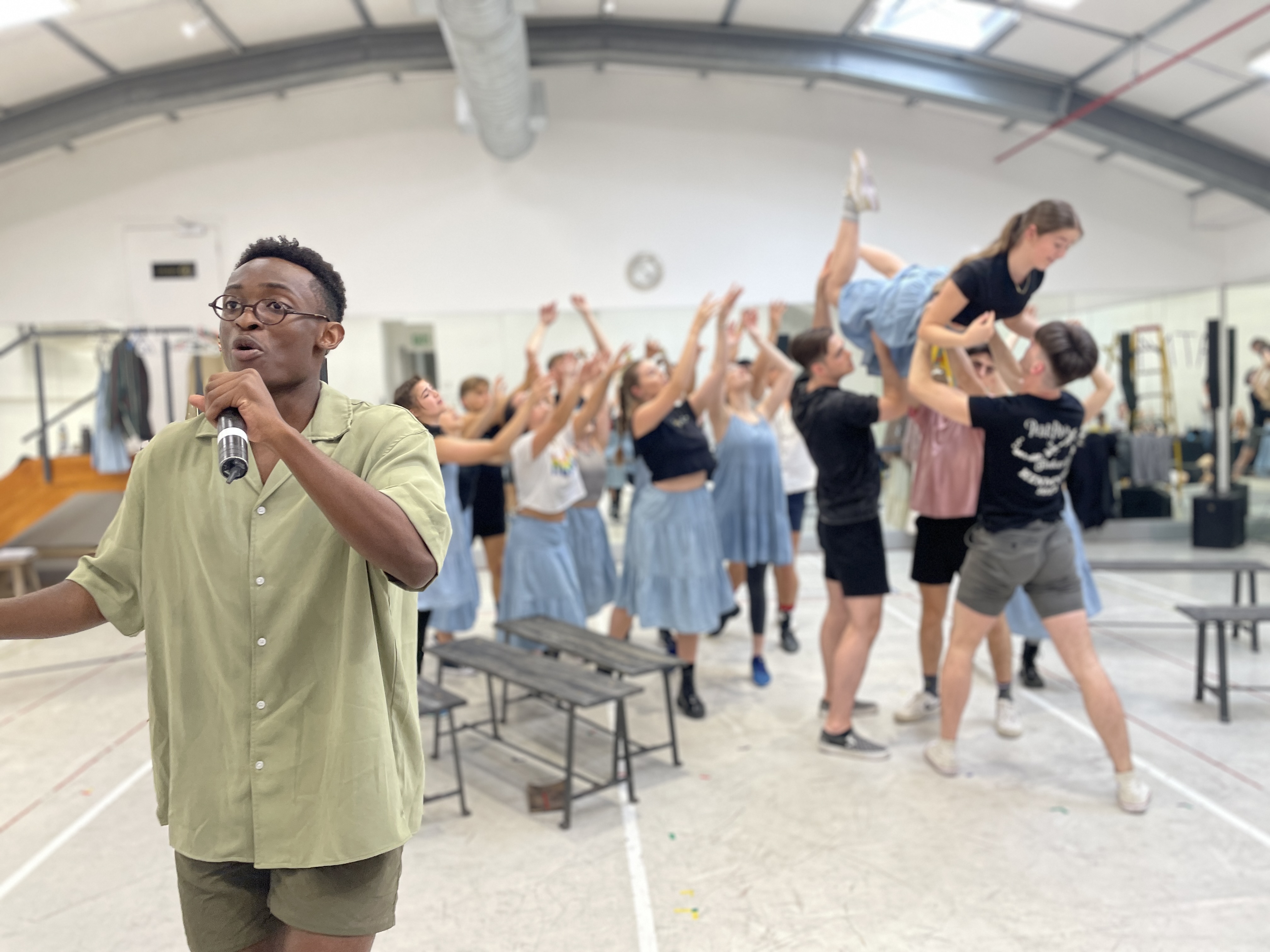
Austin Tshikosi sings while other cast members dance during a rehearsal of ‘Spring Awakening’. (Photo: Duane Alexander)
Girona believes this higher purpose is something the entire cast is intent on serving. “You will feel that what we’re doing on stage is not simply a job. We’re not singers and dancers clocking in, performing to the stars, and then clocking out. We’re actually here to tell a story and I think audiences will feel something much deeper than mere entertainment.” DM
LAMTA’s production of Spring Awakening is at Theatre On The Bay in Camps Bay, Cape Town, from 24 November to 3 December. Not recommended for under 13s. Tickets from Webtickets or Theatre On The Bay’s box office (021 438 3301).




















 Become an Insider
Become an Insider
Comments - Please login in order to comment.